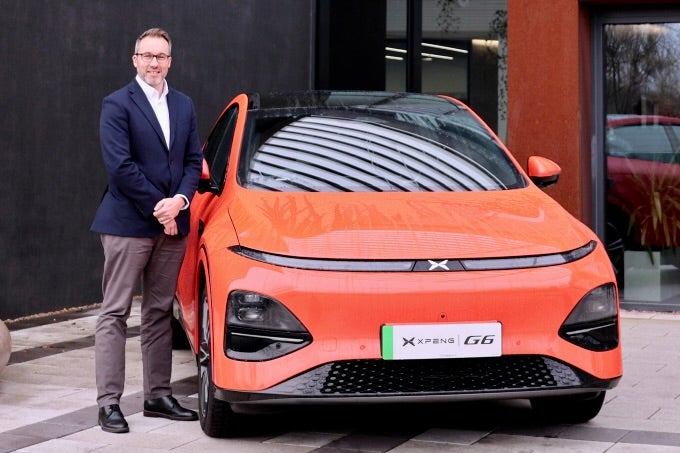UK car boss calls for electric car incentives funded by taxes on petrol and diesel
The UK importer of Subaru and Isuzu says a new environmental tax would slash the prices of electric cars

The Independent's Electric Vehicles Channel is sponsored by E.ON Next.
William Brown, boss of International Motors, has called on the government to reintroduce incentives for private buyers buying electric vehicles and for them to be paid for by taxing petrol and diesel cars.
The previous incentive system, called the Plug-In Car Grant, provided up to £1,500 towards the cost of an all-electric or plug-in hybrid vehicle. The incentive was ditched in 2022.
Under the government’s current Zero Emissions Vehicle (ZEV) mandate, which stipulates that an annually increasing percentage of all new cars sold must be zero emissions, the car industry is bracing for a 28 per cent target in 2025 unless changes are made. Currently the target is set at 22 per cent, but the industry is already falling short. So far in 2024 only 18.7 per cent of new car sales are fully electric, with most of them sold to fleets rather than private buyers.
Asked what the government should do to boost the sales of EVs to private buyers, William Brown said: “What I’d like them to do is incentivise consumers to buy electric vehicles. The government says they’re going to make the transition easier for the manufacturers, but that doesn’t solve the problem.
“The problem is we need more demand for electric vehicles and the only way to do that is to help consumers with the buying decision or the purchase of the vehicle.”
“I think there’s evidence from other markets, particularly Norway, that some sort of grant is the easiest to do. And you don’t want to make anything too complicated for the average consumer to understand.
“The Norwegian case study is fantastic evidence of how to electrify the country and keep everybody on board, and it works for the consumer as well as the industry. Once you get to that kind of level of adoption, the transition to EVs becomes so easy.”
Read more: The role of government in the EV revolution – what is Norway doing right?
Brown is at odds with automotive industry trade body SMMT, which is calling for a halving of VAT on new electric cars to boost demand and a reduction in VAT on public EV charging to bring prices in line with charging at home.
“I think a grant would be better,” said Brown.
In addition to a grant to help persuade consumers to buy more electric vehicles, Brown is hopeful that the government will adjust the current targets following an on-going consultation on the ZEV mandate.
“There needs to be changes with the ZEV mandate to the scope of the scheme and the way it works,” he said. “The targets and the fines are very heavy for the industry to take on, which is why we’re seeing things like redundancies and factory closures. It’s just not sustainable. The government needs to do something.
“If the government does implement grants or incentives, then the targets will look after themselves. But from the government’s point of view, they’ve got no way to fund this. They’ll be looking at how to pay for incentives – I think that’s the problem they face.”

Brown has a solution to funding, though, which involves taxing the purchase of cars with petrol or diesel internal combustion engines (ICE).
“Maybe the only solution is to have some sort of additional environmental tax on ICE vehicles,” said Brown. “On the one hand you’re sending a clear message that you can buy an ICE vehicle, but it’s going to cost more money. But with that money you can reinvest it to help fund incentives to get people on the journey to EVs.”
Brown also had a warning for the government on how foreign car companies are looking at the UK market, especially some of the brands his company represents.
“When you’ve got brands like Subaru and Isuzu, small niche players, looking at what’s going on in the UK and seeing the fines imposed on manufacturers, it just becomes very difficult for them to work out how to plan their business for the future. You can see the industry scratching its head and thinking, where is this all going to go?”
Where Brown doesn’t think it should go for foreign car companies importing cars into the UK is tariffs, especially for new Chinese brands like GWM and Xpeng, who both work with IM Group. The EU and the US are poised to considerably beef up existing tariffs on vehicles entering their markets from China.
“I’ve not spoken to many from the government, but the feeling w’re getting is that they’re not going to follow the European tariffs,” said Brown.
“From a government position, it’d be difficult for them to impose tariffs when they’ve got this ZEV mandate. Tarrifs and ZEV work against each other when the goal is moving towards electrification.
“You need different players in the market to give customers more choice. Obviously, they want to lower the cost of ownership of EVs, so to take away some competition doesn’t really work with ZEV. That’s where the government is at, which is why they’ve mooted that they’re not going to go the tariff route.”



Join our commenting forum
Join thought-provoking conversations, follow other Independent readers and see their replies
Comments